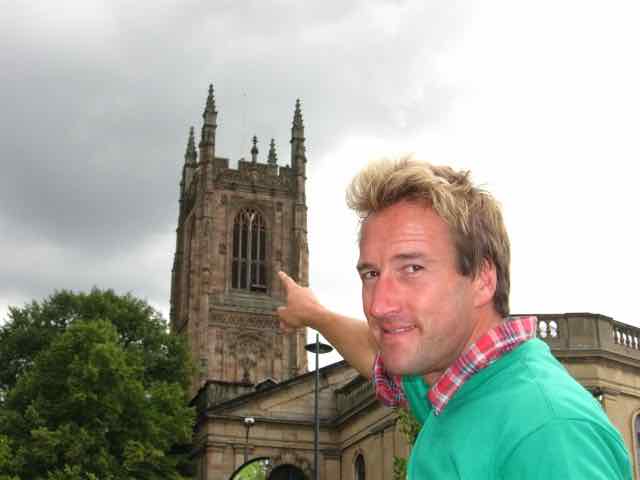I always thought that in a moment of worldwide crisis I would flee with my family to the Outer Hebrides, where we would build a hand-to-mouth life on one of the islands. And now we are in the midst of one, the reality is rather more prosaic. I am, in fact, holed up with my family in our house in the Chilterns. Still, there is something of the wilderness to it, I suppose: I’m writing this from the children’s treehouse. My son, Ludo, is on his computer in the office while my eight-year-old daughter, Iona, is in the kitchen. Marina, my wife, has taken the front room, which leaves me the treehouse.
Twenty years ago I did spend a year living on an island in the Outer Hebrides as a social experiment for the seminal Channel 4 programme Castaway to see if a group of urban folk could start a society from scratch. We were cut off from the outside world — just the 36 of us, men, women, and children, living together. The experience changed my life and I’ve been fascinated by off-grid, simple living ever since.
As a result, for nearly a decade I have travelled the world visiting people who have abandoned conventional society for a life in the wild for my Channel 5 TV show called New Lives in the Wild. Individuals, couples, families, widows, former convicts, university professors, they have been an eclectic bunch, unified in their desire to break free from the manacles of society. They are all driven by different beliefs — some are introverts, survivalists, environmentalists and apocalyptic preppers — but each has started a simpler life in the wild, cut off from the infrastructure and services of the modern world.
Take the Longs — Robert, Catherine and their children, Robin, then aged 17, and Christan, then aged 20 — sometimes described as New Zealand’s most isolated family. Their house made of driftwood in the Gorge River in the South Island took me three days’ walking to reach when I visited them in 2013.
Or the Burkinshaws, whom I visited in 2018. Mum Rose and dad Jeff and their five daughters, Sarah, Abigail, Julia, Christina and Keziah, live in a remote cabin in the northwest Canadian wilderness, where winter temperatures plunge to minus 30C.
Or the Stone brothers, who lived in a cave in Utah in the US. The identical twins, Bill and Bob, in their eighties, had been holed up in a remote cave system in the desert outback for more than 20 years when I met them first in 2014 before revisiting in 2018.
Perhaps unsurprisingly, over the past few weeks I have found myself thinking of these families and wondering what I could learn from them. Robert, Catherine, Robin and Christan Long lived in a one-room cabin. During the winter storms they were sometimes cut off from the outside world for months at a time (and indeed until just a few years ago didn’t have the internet). Yet they were one of the most rounded, happy, chatty families I have met. Creative, they used music and art to occupy themselves. They read the same books, which they would discuss.
The Burkinshaws, meanwhile, were always honing their skill set. The Burkinshaw girls chipped in.
Collecting water, felling trees and chopping firewood was only outdone by their use of a milking machine, blow torches and welding machines. The two eldest daughters, feeling claustrophobic in the cabin, decided to move out, which involved building themselves a new house: cutting the trees, milling the wood and digging the foundations. They were 15.
Could we Fogles even attempt to do something similar? Like so many people, I have always wanted to spend more time living a simple life with my family. So, at the start of this strange period I had visions of the Good Life: crops growing perfectly in our little allotment, splitting wood together and stacking it ready for the winter. Sitting around a fire, whittling wooden spoons while sharing stories and anecdotes.
Alas, the reality has not quite matched the ideal. Early on I dug up part of the garden in an enthusiastic rush to start our vegetable patch, only to discover that deer, badgers and rabbits use our rural garden as their market garden. Our hard work was soon animal feed.
Wood chopping went well until we discovered that the axe was too heavy for Ludo and Iona to wield safely. Oh, as for games and the planned book club à la Longs? As I write, I realise that everyone, including the dog, is glued to a screen. The Good Life is now Screen Life.
That’s before we even get to the “homeschooling”, which has given me new levels of respect for teachers. As a man who failed many of his exams, managing to get an N in one of my A levels (apparently it stands for nearly), I have never felt fully capable of teaching academic subjects.
Which is not to say our attempts at emulating my remote role models have all been in vain. Hunting for something to compensate for my poor maths skills (I also got a D in A level economics), I found myself ditching the algebra for The SAS Survival Handbook. The children have learnt how to build a shelter and we have been attempting to start a friction fire with sticks. They have also mastered how to clean a loo, which involved lots of theatrical retching, and they can now tie a bowline sailing knot.
I’ve started to look at this period together as a family as a blank canvas to learn the things we never had time to do before. Simple life skills that are often overlooked.
Plenty of those I visited before the pandemic had been preparing for this moment of worldwide chaos all their lives. Often referred to as “preppers”, they have been hoarding supplies for decades and building themselves underground bunkers. The Stone brothers were undoubtedly of that persuasion — former soldiers, their cave was like something from a film. Inside, a series of bombproof metal doors hid their supplies. Behind one was a two-year supply of food and equipment, including mayonnaise, tomato sauce, rice and tuna. There was one door that remained hidden until I revisited several years later: that area contained a typically American arsenal of weapons and ammunition.
While I’m definitely not suggesting now is the moment to be stockpiling arms — or, indeed, anything else — what this crisis has reminded us of is our reliance on others for work, for food, for money, for our health. The idea of self-sufficiency seems appealing. Strange as it sounds, I’ve felt myself thinking enviously of perhaps the hardiest of the wild folk I met: Lynx, who adhered strictly to a Stone Age lifestyle in the forests of Washington state, hunted with stone arrows and kept warm with the skins of the animals she hunted. Her home, a hole in the ground with animal skins for insulation and candles for light, even had a wood-fired whirlpool bath.
Short of having a plane and a forest to chop down, the children have embraced horticulture, growing veg from seeds, propagating and then planting. We built the timber structure around the beds and the children have become resourceful at making things out of scrap wood and cardboard.
We have been whittling wood to make spoons as gifts, and the children have helped to plant up a vegetable patch. With boredom comes creativity, and the children and I have had fun making adventure films in the home. Iona has also joined me on a daily adventure broadcast on social media, where we have tried to keep people company with tales of our travels and adventures, allowing people to go on a journey vicariously.
If you had told me a year ago that this is how I would be spending the spring of 2020, I may not have believed you. Life feels as though it has changed unimaginably. Yet over the past few weeks I have been in touch with some of my wild folk by email (despite their isolation, many of them remain hooked to the internet grid) and they have all told me the same thing: their lives haven’t changed at all. Perhaps they were one step ahead of us all along. They were certainly better prepared than me.
And as for us, like the rest of the world we are in limbo, trying to make the most of a difficult circumstance, and if you want to find me I’ll be in the woods building a cabin. Or trying to.
powkey Portable Power Station 350W, 260Wh/70,000mAh Backup Lithium Battery, 110V Pure Sine Wave Power Bank with 2 AC Outlets, Portable Generator for Outdoors Camping Travel Hunting Emergency
Now retrieving the rating.
$192.98 (as of April 24, 2024 13:58 GMT +01:00 - More infoProduct prices and availability are accurate as of the date/time indicated and are subject to change. Any price and availability information displayed on [relevant Amazon Site(s), as applicable] at the time of purchase will apply to the purchase of this product.)Amazon Visa
Now retrieving the rating.
$23.00 (as of April 24, 2024 13:58 GMT +01:00 - More infoProduct prices and availability are accurate as of the date/time indicated and are subject to change. Any price and availability information displayed on [relevant Amazon Site(s), as applicable] at the time of purchase will apply to the purchase of this product.)200W Portable Power Station, Powkey 120Wh/33,000mAh Power Bank with AC Outlet, 110V 6 Outputs Solar Generator External Battery Pack with LED Light for Home Use and Outdoor Camping
Now retrieving the rating.
31% OffAnker Power Bank Power Station 60,000mAh,Portable Outdoor Generator 87W with Smart Digital Display, Retractable Auto Lighting and SOS Mode, Home Backup(PowerCore Reserve 192Wh) for Travel, Camping
Now retrieving the rating.
$149.99 (as of April 24, 2024 13:58 GMT +01:00 - More infoProduct prices and availability are accurate as of the date/time indicated and are subject to change. Any price and availability information displayed on [relevant Amazon Site(s), as applicable] at the time of purchase will apply to the purchase of this product.)Foldable Solar Panel Charger 60W with 18V DC Output (11 Connectors) for 100W~350W Portable Power Stations Jackery/Rockpals/Flashfish/Enginstar, Portable Solar Generator for Outdoor Camping Van RV Trip
Now retrieving the rating.
$98.99 (as of April 24, 2024 13:58 GMT +01:00 - More infoProduct prices and availability are accurate as of the date/time indicated and are subject to change. Any price and availability information displayed on [relevant Amazon Site(s), as applicable] at the time of purchase will apply to the purchase of this product.)





